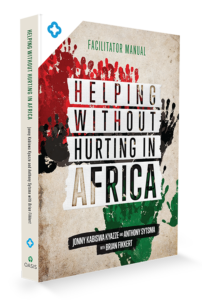In Africa the business world and the church have always had different views on doing business. Sometimes Christians see people in business as those who love money, who are corrupt, or people who are too concerned with worldly things. Christians often view the business world as a no-go area, because of the demands and challenges involved. On the other hand, the business world often sees the church as a place for meeting spiritual needs with people who want an easy life and don’t understand how to work hard or make money.
When it comes to business and wealth creation, there are two extremes that Christians need to avoid. On one extreme are those who view business as a worldly activity which makes Christians morally contaminated. These Christians don’t see the value of earning money for the sake of God’s kingdom. The other extreme are Christians immersed in the prosperity gospel who think that God has guaranteed to make us rich through our businesses. These Christians focus too much on money and material things. They say that they earned their riches through their hard work, faith, and obedience, and so it is okay for them to enjoy luxury even while others suffer in poverty.
God’s encourages Christians to engage in business.
In contrast to these extremes, we argue that God’s word encourages Christians to engage in business and wealth creation. Yet we believe that Christians should create wealth for the sake of God’s kingdom and to help the poor.
The Biblical View of Business
One of the most common ways that people work to earn money is by being involved in business. While the Bible warns about doing business in a way that dishonours God, it also looks at business as a normal part of human life. Business can be a very good thing when it is done in a way that honours God. In fact, business is an important part of development.
The biblical assumption is that most of us will be engaged in business activity as a regular part of life.
The very fact that so many biblical passages teach that it is sinful to cheat people by being dishonest in business shows the biblical assumption that most of us will be engaged in business activity as a regular part of life. Jesus used business and earning profit in his parable of the ten minas as a positive symbol referring to good stewardship of the gospel and ministry in God’s kingdom (Luke 19:11-27). There are passages that directly encourage hard work through business to make profits and earn money. For example, “A slack hand causes poverty, but the hand of the diligent makes rich” (Proverbs 10:4).
The famous passage from Proverbs 31 praises a noble wife who engages in businesses of many kinds. She:
- “Considers a field and buys it; with the fruit of her hands she plants a vineyard” (Proverbs 31:16)
- “Perceives that her merchandise is profitable” (Proverbs 31:18)
- “Makes linen garments and sells them; she delivers sashes to the merchant” (Proverbs 31:24).
For other passages that touch on creating wealth or doing business see: Proverbs 12:11; 12:24; 13:11; 14:23; 21:5; Matthew 25:14-30; Acts 18:1-3; and 2 Thessalonians 3:10-11.
Business for the Common Good
We need to encourage Christians in our churches that business is not evil. Of course, some people use business to exploit others, destroy God’s creation, or for greedy purposes. But business can be done in a God-glorifying way, and as a form of helping people out of material poverty. Businesses provide jobs that help materially poor people develop their lives and families, become generous stewards, and bless others with the fruits of their work.
Business can honour God by wisely using his creation in a way that helps people.
Sometimes Christians have viewed business negatively because of the competition involved in it. It is true that people can make an idol out of defeating their competitors or out of making the highest profits possible. But also consider how competition in sports encourages teamwork and pushes our bodies to new physical accomplishments. Similarly, competition in business can produce innovation, creativity, and good quality products and services. When done well for God’s glory, business can also contribute to trust, fairness, and discipline in a society. When done with integrity, the products of business not only benefit the seller, but they also provide something to the customer.
Business can honour God by wisely using the things in God’s creation in a way that helps people. Pope Francis wrote: “Business is a noble vocation, directed to producing wealth and improving the world. It can be a fruitful source of prosperity for the area in which it operates, especially if it sees the creation of jobs as an essential part of its service to the common good.”
Christians are also able to honour God in business by earning more money to support Christian ministry and to help take care of the poor. This is the reason we should encourage people to work and not try to keep Christians in church programmes every day, but rather encourage them to serve God by working in their businesses throughout the week. Then they can give generously and support the ministries of the church and help those in need. John Wesley, an English preacher, famously said, “Earn all you can! Give all you can! Save all you can!” Many charity organisations, churches, ministry programmes, and government programmes are supported by individuals and institutions that do business. They pay taxes, employ people, and fund development projects.
Ministry and Profitable Christian Businesses
We can learn from the example of Rebecca (name changed and story used with permission). She succeeded in business despite discouragements from friends who thought that Christians can’t do well in business. Rebecca is the wife of a pastor in Kampala. She started a supermarket as a way of contributing to her family’s income and also to encourage other women. She started with one supermarket branch selling household items to Christians from the church but also others within the community. Her business expanded and she even opened another supermarket.
She viewed her business as a calling, part of God’s plan for her life.
Fellow church members and other business people had warned her that a Christian woman cannot succeed in business unless she is willing to compromise her faith. It was hard to begin with such lack of support from friends. To her friends’ surprise, in the end it was her Christian faith and support from her husband that helped her to succeed. Many people purchased items from her supermarket because she made sure to sell quality goods and she attended to her customers well, caring for them as people. She viewed her business as a calling, part of God’s plan for her life, and a way for her to honour God.
Her business has been a motivation and encouragement to other Christians in Kampala, especially Christian women. For Christians can engage and succeed in business without compromising their faith. She is now hosted at churches to talk about doing business as a Christian, and she holds talk shows to explain how to overcome the challenges of doing business in an environment full of non-believers, who do not have the same moral values as Christians. Many people, including single mothers, wives of Christian leaders and youth have started businesses after hearing her testimony.
Questions for Reflection
- How do the business people of your town view your local church and Christians? How can you befriend them and affirm the value of their work?
- In your preaching, do you encourage both men and women to engage in hard work and business like the Proverbs 31 woman?
- Is it possible for a Christian to be highly successful in business?
- Does your church culture discourage Christians from working in business for six days a week, and instead tries to keep them engaged in church programs every day?

Helping Without Hurting in Africa: Facilitator Manual trains leaders to proclaim the gospel in both word and deed, changing mind-sets and helping them apply biblical principles to care wisely and compassionately for people who are poor without unintentionally doing harm.
Helping Without Hurting in Africa provides readers with the foundational concepts and tools in Christ-centered poverty alleviation and doubles as a ready-to-use facilitator manual that helps participants:
- Grow in their relationships with God, others, self, and the rest of creation.
- Gain a new focus on the kingdom of God in their ministries.
- Renew their love and compassion for the materially poor.
- Obtain knowledge about how to help low-income individuals and communities more wisely.
- Empower churches and ministries to bring lasting change, starting with their own resources.
Contact Oasis Regional Directors to order Helping Without Hurting in Africa: Facilitator Manual:
- Regional Director East Africa: WhatsApp: +27 79 572 4877
- Regional Director West Africa: WhatsApp +234 809 111 1184
More ordering information at oasisinternationalpublishing.com/buy















